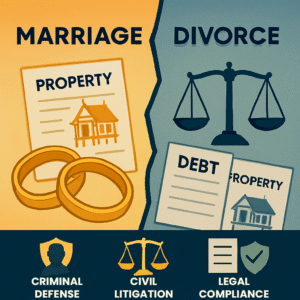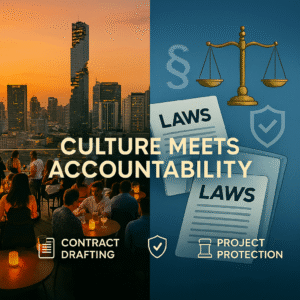Debunking the myth: Foreigners can take action against Thai Debtors
- The Thai legal system offers mechanisms for foreigners to pursue debt recovery, including civil lawsuits, bankruptcy proceedings, and business rehabilitation actions.
- Civil cases for debt collection and bankruptcy actions ensure equitable repayment based on the size of creditors’ claims, while business rehabilitation helps debtors restructure and continue operations.
- Engaging experienced local legal counsel is essential for navigating Thai debt collection laws and ensuring compliance with legal procedures.
For far too long, a pervasive myth has circulated amongst foreigners residing in Thailand that they do not have any legal recourse when it comes to taking action against debtors in Thailand.
This misconception has left many international creditors feeling frustrated and vulnerable.
From civil lawsuits to bankruptcy proceedings and business rehabilitation actions, the Thai legal system is designed to ensure there are various avenues that claimants can take to ensure that debts are acknowledge and paid, regardless of the creditor’s nationality and location.
Civil Case for Debt Collection
A civil lawsuit or arbitration claim is a formal legal action initiated by a creditor to recover outstanding debts from a debtor. This process involves filing a case in a court of law or presenting the dispute to an arbitration panel. The goal is to obtain a judgment or award that enforces the debtor’s obligation to repay the owed amount, thereby facilitating debt collection through legal channels.
To initiate the process, a creditor will initiate legal proceedings against the debtor. If the debtor fails to settle the debt owed to the creditor, a court can enforce a judgement by way of seizure of the debtor’s assets. Once the seizure process has taken place, the debtor’s assets can be sold by way of public auction to satisfy partial or full repayment of the debt.
By initiating a civil case for debt collection, this is a suitable option wen the debtor has defaulted on their repayment obligations and is indebted to only the creditor that has brought legal proceedings against them.
Bankruptcy Action
Under Thailand’s Bankruptcy Act (No.10), B.E. 2561 (A.D. 2018), governmental authorities can seize the debtor’s assets, sell them at a public auction, and distribute the proceedings from the auction amongst the various creditors.
Creditors are repaid based on the amount of their outstanding debts, meaning that the distribution of payments is proportional to the size of each creditor’s claim. This ensures that each creditor receives a fair share of the debtor’s available assets relative to the total amount owed. This process is designed to provide an equitable resolution for all parties involved, reflecting the principle that larger claims receive correspondingly larger repayments.
Bankruptcy action can only be initiated when the debtor’s liabilities exceed their current assets and their business can continue in its current form.
Business Rehabilitation Action
The primary objective of business rehabilitation is to enable debtors at risk of insolvency to sustain their operations and successfully restructure their financial situation.
This process aims to provide a viable path for debtors to overcome financial distress, ensuring their long-term business viability and stability. By ensuring that the business continues, creditors will be in a much stronger position to reclaim monies owed to them in the future.
By opting to pursue business rehabilitation, the aim will be to try and ensure that a debtor’s business can rehabilitate, thus resulting in the debtor being able to satisfy their debts with their creditors.
Additional Considerations for Foreigners
To ensure compliance with local laws and regulations, it is essential that a creditor retains experienced local legal counsel to ensure that they can navigate the various complexities in regard to debt collection in Thailand.
While in some cases this may be impossible, the recovery of debts from a debtor can be done without needing to resort to legal proceedings. It is advisable that you seek the services of a recognised legal practitioner in Thailand before looking to recovery a debt in Thailand.
If you have any specific questions or need further assistance, feel free to reach out to the team at WSR International.





